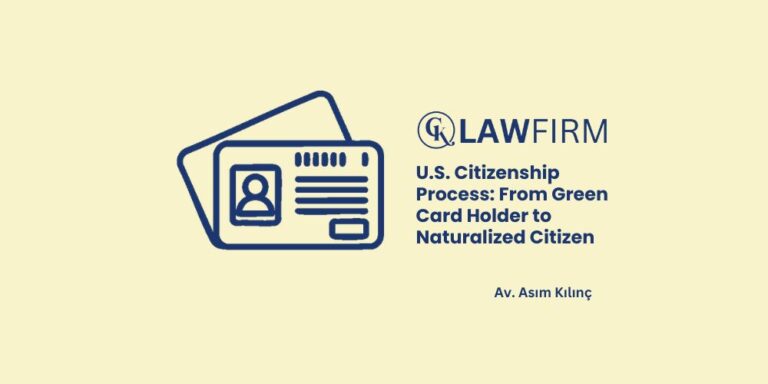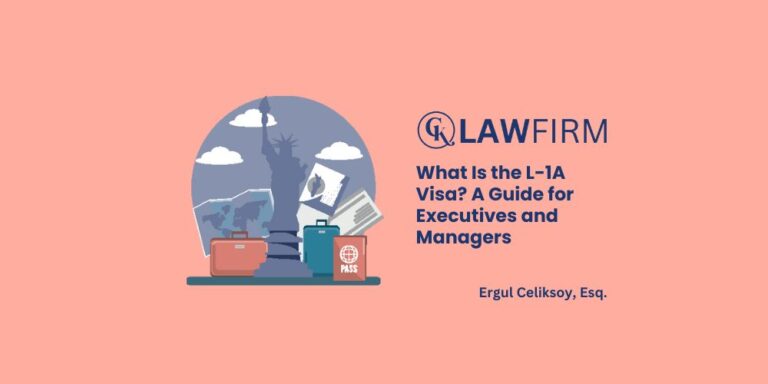Schedule an Appointment with Our Attorneys Now

What is a Green Card and How to Apply?
Discover the step-by-step Green Card application process, eligibility requirements, and benefits of permanent residency in the United States.
By Asim Kilinc, Immigration Attorney at CK Law Firm
Thousands of people around the world, including in our country, apply for a Green Card. In this article, we will discuss the following topics:
- What is a Green Card?
- What are the Advantages of a Green Card?
- Who Can Apply for a Green Card?
- How to Apply for a Green Card?
- Where to Apply for a Green Card?
If you have any other questions related to this topic, please don’t hesitate to reach out to me via the comment section below, send me a message directly on LinkedIn, or contact me through the CK Law Firm Immigration Law Firm website, of which I am a founding partner.
What is a Green Card?
A Green Card is an official document that grants permanent residency in the United States. Officially known as the “Permanent Resident Card,” this card allows its holder to live, work, and study in the U.S. indefinitely. Green Card holders are also eligible to apply for U.S. citizenship under certain conditions.
What are the Advantages of a Green Card?
There are numerous advantages to being a Green Card holder. Some of the primary benefits include:
- Permanent Residency and Work Rights: Green Card holders have the right to live and work in the U.S. indefinitely. They can work in any job without needing a work permit.
- Sponsoring Family Members: Green Card holders can sponsor their spouses and unmarried children under 21 to come to the U.S.
- Education and Scholarships: Green Card holders can benefit from in-state tuition rates and apply for student loans, grants, and scholarships like U.S. citizens.
- Citizenship Application: After residing in the U.S. for a certain period (usually five years), Green Card holders are eligible to apply for U.S. citizenship.
- Travel Freedom: Green Card holders face fewer restrictions when entering and leaving the U.S. However, they should be cautious about long-term travel abroad, as it could jeopardize their Green Card status.
- Property Ownership: Green Card holders have the right to own property in the U.S. and can invest in real estate.
- No Need for Visa Renewal: Unlike temporary visas, a Green Card does not require continuous renewal. It is renewed every 10 years.
These advantages highlight why the Green Card is highly sought after by many and its value for those planning to live permanently in the U.S.
Who Can Apply for a Green Card?
People eligible to apply for a Green Card can be categorized under various groups. The U.S. government offers different pathways for Green Card applications, each based on specific criteria. Some of the main groups eligible to apply for a Green Card include:
- Family Members
- Immediate Family of U.S. Citizens: U.S. citizens can sponsor their spouses, unmarried children under 21, and parents for a Green Card.
- Family Members of Green Card Holders: Green Card holders can also sponsor their spouses and unmarried children. However, the family members of U.S. citizens are given priority.
- Employer Sponsorship
- Skilled Workers: Qualified workers who are offered employment in the U.S. can apply for a Green Card. This category may include skilled workers, professionals, and unskilled workers.
- Investors: Foreign investors who make a substantial investment and create jobs in the U.S. may also obtain a Green Card.
- Diversity Visa (Green Card Lottery)
- Diversity Visa Program: Each year, a lottery is held for people from countries with low immigration rates to the U.S. Those who win the lottery are eligible to obtain a Green Card. Applications must meet the criteria set for the lottery.
- Refugees and Asylees
- Refugees or Asylees: Individuals accepted as refugees or asylees in the U.S. can apply for a Green Card after residing in the country for a certain period.
Each category has specific eligibility requirements, and applicants must meet these criteria to apply for a Green Card. Many people prefer to seek the assistance of a legal advisor before starting the Green Card process.
How to Apply for a Green Card?
Applying for a Green Card is a step-by-step process and may vary depending on the category applied for. However, the general steps to follow are:
- Check Eligibility Criteria
- First, determine which Green Card category you are applying under (family sponsorship, employer sponsorship, Green Card lottery, etc.).
- Carefully review the eligibility criteria. The category you apply for will affect the required documents and process.
- Fill Out Application Forms
- Family or Employer Sponsorship: Your sponsor initiates the application process by submitting Form I-130 (for Family Sponsorship) or Form I-140 (for Employer Sponsorship) to USCIS. Once USCIS approves the sponsor’s application, the applicant can move on to the next step.
- Green Card Lottery (Diversity Visa Program): To participate in the Green Card lottery, you must apply online within the specified dates. There is no fee for the application, and it can only be submitted through the official Diversity Visa Program website.
- Apply for Immigrant Visa or Adjustment of Status
- For Those Outside the U.S.: If you are outside the U.S., the process continues through a U.S. consulate or embassy, guided by the National Visa Center (NVC). Complete Form DS-260, and your biometrics will be collected, followed by a consular interview.
- For Those Inside the U.S. (Adjustment of Status): If you are inside the U.S., you must fill out Form I-485 (Application for Adjustment of Status) to apply for a Green Card.
- Gather Required Documents
- Prepare all necessary documents such as identification, birth certificate, marriage certificate, divorce decrees (if applicable), criminal records, medical examination results, and financial documents.
- Ensure all your documents are complete and accurate. Any errors could delay the process.
- Pay Application Fees
- Various forms and processes require payment of fees during the application process. The amount varies depending on the category and where the application is submitted.
The Green Card application process can be complex, and it’s crucial to provide correct information and documents at every step. Many applicants choose to seek support from an immigration attorney during this process.
Where to Apply for a Green Card?
Where you apply for a Green Card depends on the category and location of the applicant. Here are the general application processes and where to apply:
- For Those Inside the U.S. (Adjustment of Status)
- If you are legally present in the U.S. and wish to apply for a Green Card, you must apply through USCIS.
- Form I-485 (Application for Adjustment of Status) is submitted to USCIS, which manages this process and conducts necessary reviews.
- For Those Outside the U.S. (Immigrant Visa Application)
- If you are outside the U.S., the Green Card application process is handled through a U.S. consulate or embassy.
- First, your sponsor must apply to USCIS. Once this application is approved, your case will be processed by the National Visa Center (NVC).
- The NVC collects the necessary documents for your immigrant visa application and provides instructions. You will then attend an interview at a designated U.S. consulate or embassy.
- Complete and submit Form DS-260 (Immigrant Visa Application) online to the NVC.
- Green Card Lottery (Diversity Visa Program)
- Applications for the Green Card lottery are submitted online only through the official website of the U.S. Department of State’s Diversity Visa Program.
- It doesn’t matter whether you are in the U.S. or another country; the application is entirely online.
Tracking the Application Process
- After applying, you can track your application status through USCIS or the NVC. Both institutions offer online tools to check the status of your application.
In conclusion, it’s essential to provide accurate information and documents at every stage of the application. Due to the complexity of the process and legal requirements, seeking assistance from an immigration attorney can be beneficial. If you wish, you can contact me via cklawfirm.org, email info@cklawfirm.org, or directly on LinkedIn.
Who is Attorney Asım Kılınç?
Attorney Asım Kılınç is the co-founder of CK Law Firm and is recognized for his expertise in immigration law and U.S. asylum applications. Kılınç completed his Master’s degree at Southern Methodist University Dedman School of Law and is a member of the Missouri Bar Association, with a focus on U.S. immigration law.
Attorney Kılınç’s extensive knowledge and experience in immigration law have significantly contributed to CK Law Firm’s success in this field. He has actively participated in the preparation of over 1,000 cases, demonstrating his expertise in this area. By providing comprehensive and professional legal support to his clients, he helps them adapt to their new lives in the U.S.
Attorney Kılınç is also well-versed in U.S. asylum applications. He meticulously guides his clients through the process and ensures they receive the best legal advice. He provides top-quality service to clients in matters of citizenship, Green Card, work permits, and other immigration processes, supporting them from start to finish on their journey to U.S. citizenship.
Attorney Asım Kılınç, who solidifies CK Law Firm’s leadership in immigration law and U.S. asylum applications, offers reliable and effective legal consultancy services to clients, assisting them in building a new life in the U.S.





